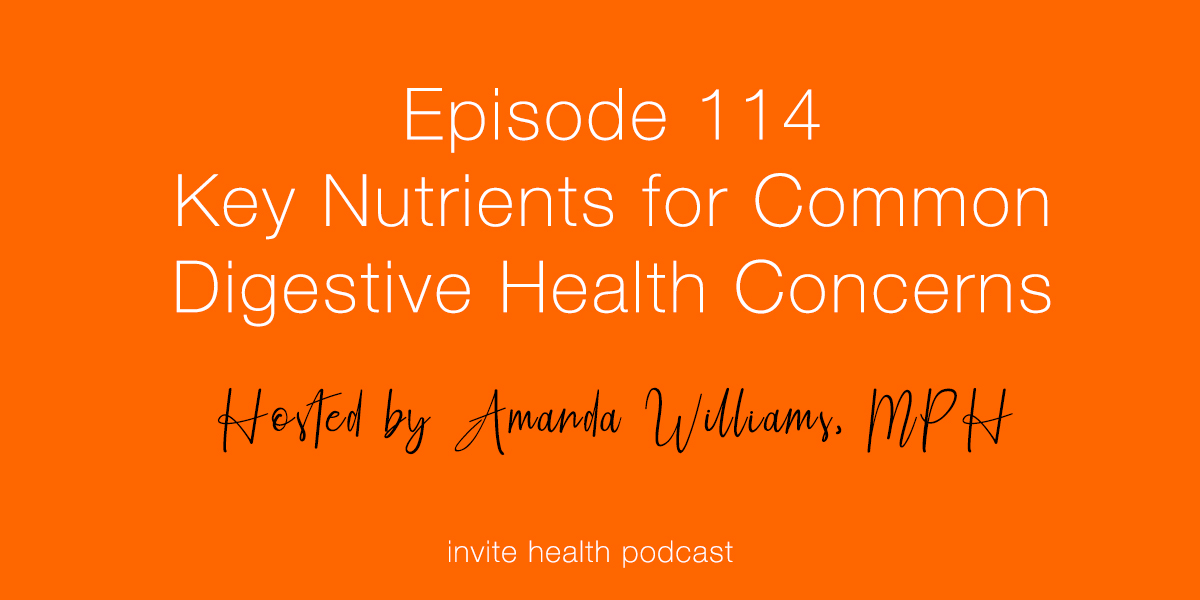Key Nutrients for Common Digestive Health Concerns – Invite Health Podcast, Episode 114

Invite Health Podcast, Episode hosted by Amanda Williams, MPH
Subscribe Today!
On today’s episode we are going to be discussing digestive health. Recently we released an episode that discussed the importance of digestive enzymes, especially in the setting of the aging process due to the fact that aging makes our ability to produce digestive enzymes slow down. Click here to listen to that episode now! Today we are going to be talking about key nutrients for digestive health and talk about the reason why so many people are impacted with digestive issues today, including H. Pylori.
Common Digestive Health Concerns
A large percentage of the United States population is impacted by digestive health conditions. GERD is one of them. Roughly about 40% of the US population has Gastroesophageal reflux disease, or GERD. There are a few reason why that is. If you look at the Standard American Diet that supplies high fat, high processed and high sugar foods, its clear that we are not obtaining the nutrients we need on a daily basis. To do this, the Mediterranean Diet is a good choice, as it supplies nutrients through high quality foods, like nuts, oils and protein. Learn more about the Mediterranean Diet by clicking here!
Only 12% of Americans are “metabolically healthy”.
– University of North Carolina study
Another factor to look at when it comes to digestive concerns are nutrient deficiencies, especially Zinc. Throughout the world, Zinc deficiency is quite common. About 15% of the general United States population is Zinc deficient. But this actually changes when you look at different age groups and races. The incidence of Zinc deficiencies certainly increase as we study older populations. This is very important, as Zinc plays a critical role in so many aspects of our overall health. We must have an adequate amount of Zinc in order to properly support our bodies immune system function, wound healing, and vision health. There is a strong correlation between Zinc deficiencies and GI issues, including H. Pylori infections.
What is H. Pylori?
Helicobacter pylori, or H. Pylori, is a common bacteria that can do a lot of damage to the stomach. It is one of the most common infections worldwide and is the number one cause of ulcers and gastric cancer. Where H. Pylori infections are high across the world, so are Zinc deficiencies. But most doctors do not even test for it.
This bacteria enters your body and lives in your digestive tract, causing ulcers in the lining of you stomach or your small intestine. For some, this infection can lead to stomach cancer. When this bacteria enters your body, it attacks the lining of your stomach which impacts your bodies ability to protect you from the acid it needs to digest food. Once the acid gets through the lining, an ulcer can occur, causing bleeding and infection. You can get this bacteria from contact through saliva or other body fluids. Countries or communities that lack clean water or good sewage systems seems to have more common occurrences. Two professors from the University of Western Australia won the Nobel prize for their findings of H. Pylori in 2005. The professors kept detecting this bacteria in different stomach biopsy’s and found a unique correlation between the severity of the inflammation and H. Pylori bacteria. It is estimated that 20% of people under the age of 40 in the United States have been infected by H. Pylori.
Key Nutrients that Support Healthy Digestion
As we previously discussed, Zinc is extremely important for digestion and overall wellness. A combination of nutrients that includes Zinc and Carnosine can help promote the health of the stomach and intestinal lining, relieve occasional gastric discomfort and help to maintain a healthy gastric intestinal environment.†
Research has shown that a certain amount of “good” bacteria in your intestines is necessary for proper digestion and overall health. The body needs certain strains of this healthy bacteria to counteract the negative effects of unhealthy bacteria in your system. Inadequate amounts of healthy bacteria in the intestines often lead to digestive problems such as bloating and gassiness. A superior Probiotic supplement offers different probiotic strains that work to fight off this unhealthy bacteria, improving bloating, flatulence, occasional gastric distress, diarrhea and constipation.†
Sourced from pineapple, Bromelain is a natural proteolytic enzyme supports comfortable digestion of proteins such as meat, eggs, and dairy proteins by breaking down these proteins into smaller components. Lactase is an enzyme that helps break down the lactose (milk, sugar) in your body to support healthy digestion of dairy products and relieve symptoms of occasional or severe lactose intolerance.†
Thank you for tuning in to the Invite Health Podcast. You can find all of our episodes for free wherever you listen to podcasts or by visiting www.invitehealth.com/podcast. Make sure you subscribe and leave us a review! Follow us on Facebook, Twitter and Instagram at Invite Health today. We’ll see you next time on another episode of the Invite Health Podcast.


